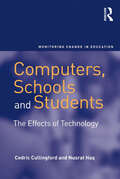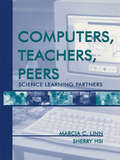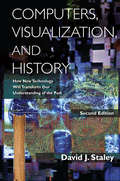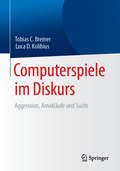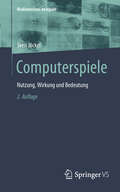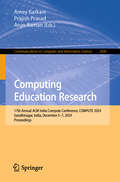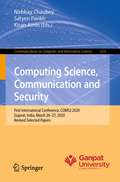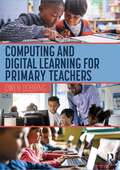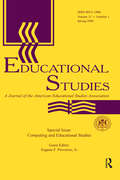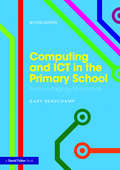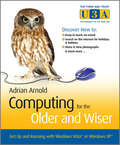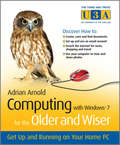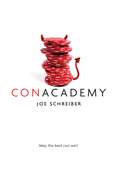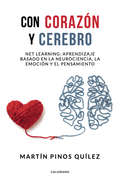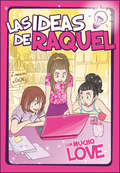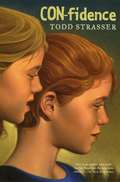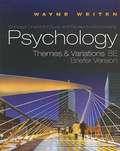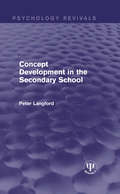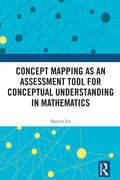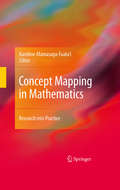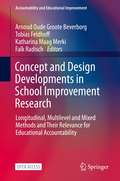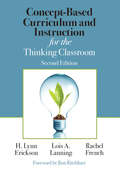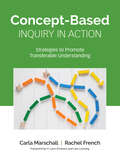- Table View
- List View
Computers, Schools and Students: The Effects of Technology (Monitoring Change In Education Ser.)
by Cedric Cullingford Nusrat HaqHow have schools been affected by the introduction of computer technology, and has it changed the school life and experience of students? This book uses research from both large and small secondary schools, including those specializing in technology and those with higher numbers of pupils with special needs, to look at the results of all the political initiatives and investment in ICT. The authors found that the ambitious expectations fell short of reality. Their research into the reasons for this shortfall can help teachers understand and develop ways to make the best use of computers in their schools. It is equally informative for educational researchers and policy-makers.
Computers, Teachers, Peers: Science Learning Partners
by Marcia C. Linn Sherry HsiLinn and Hsi show how computers, teachers, and peers can serve as learning partners--helping students build on their ideas and become lifelong science learners. They invite everyone interested in improving science education to build on their experiences, share insights on the Internet, and create instruction. Computers, Teachers, Peers: * offers case studies to bring the ideas of students learning science to life. *Join Sasha, Chris, Pat, and Lee as they try to make sense of experiments using computers to display data in real time;* * provides principles to help teachers improve their instruction, use technology better, and inspire more students to love science. *Find out how to use visualization tools, online discussion, and more to make science relevant;* * gives researchers and instructional designers a model for effective research and curriculum design. *Linn and Hsi report that the partnership approach to research resulted in a 400% increase in student understanding of science;* * helps schools develop technology plans that continuously improve science instruction. *Find out how schools can design better ways to use technology for learning;* * describes a partnership inquiry process where science teachers, science education researchers, discipline specialists, and technologists consider each others' perspectives and jointly design instruction. *Boys and girls are equally successful in the resulting science courses;* and * features practical tools for learning and instruction, including "Points to Ponder"--to encourage reflection on the ideas in each chapter (partnership groups or classes might use the points as discussion starters or assignments), and "Ask Mr. K."--an interview, in each chapter, with the classroom teacher who was a founding member of the CLP partnership (in these interviews Mr. K. adds insights from his own classroom experiences). This book is supplemented by a CD-ROM (included in each copy) and a Web site (www.clp.berkeley.edu) with the Computers as Learning Partners curriculum, lesson plans, a Quicktime virtual reality visit to the classroom, copies of assessments, opportunities to join partnerships, and more. For readers who wish for more information, Related Readings are cited, including works by authors mentioned in each chapter. Additional works by other authors who inspired the authors appear in the bibliography, on the website, and on the CD-ROM. An annotated bibliography of papers by the members of the CLP partnership also appears at the website and on the CD-ROM.
Computers, Visualization, and History: How New Technology Will Transform Our Understanding of the Past
by David J StaleyThis visionary and thoroughly accessible book examines how digital environments and virtual reality have altered the ways historians think and communicate ideas and how the new language of visualization transforms our understanding of the past. Drawing on familiar graphic models--maps, flow charts, museum displays, films--the author shows how images can often convey ideas and information more efficiently and accurately than words. With emerging digital technology, these images will become more sophisticated, manipulable, and multidimensional, and provide historians with new tools and environments to construct historical narratives. Moving beyond the traditional book based on linear narrative, digital scholarship based on visualization and hypertext will offer multiple perspectives, dimensions, and experiences that transform the ways historians work and people imagine and learn about history. This second edition of Computers, Visualization, and History features expanded coverage of such topics as sequential narratives, 3-D modeling, simulation, and video games, as well as our theoretical understanding of space and immersive experience. The author has also added "Guidelines for Visual Composition in History" for history and social studies teachers who wish to use technology for student assignments. Also new to the second edition is a web link feature that users of the digital edition can use to enhance visualization within the text.
Computerspiele im Diskurs: Aggression, Amokläufe und Sucht
by Tobias C. Breiner Luca D. KolibiusDieses Fachbuch ist eine umfassende Abhandlung zur Debatte um die negativen Auswirkungen von Computerspielen: Aggressionen, Amokläufe und Sucht. Die kontroverse Debatte zur Beziehung zwischen Computerspielen und Aggression wird hier auf Grundlage neuster wissenschaftlicher Erkenntnisse aufgearbeitet. Darüber hinaus inspirierte die Aufnahme in die aktuellste Version des Klassifikationssystems DSM für Internet Gaming Disorder (Computerspielsucht) eine Vielzahl wissenschaftlicher Veröffentlichungen, welche hier übersichtlich zusammengetragen werden. In diesem Buch finden Sie die Antworten auf folgende Fragen: Welche Symptome machen eine Computerspielabhängigkeit aus und welche Therapiemöglichkeiten gibt es?Geht Computerspielsucht mit Veränderungen im Gehirn und der Persönlichkeit einher?Gibt es eine kausale Beziehung zwischen Computerspielen einerseits und Aggressivität und Amokläufen andererseits? Die Autoren kommen dabei nach Sichtung der Studienlage zu überraschenden Erkenntnissen. Dieses Buch unterstützt Psychologen, Psychotherapeuten, Psychiater, Pädagogen, Therapeuten, Lehrkräfte und Eltern die Welt der Computerspiele zu navigieren.
Computerspiele: Nutzung, Wirkung und Bedeutung (Medienwissen kompakt)
by Sven JöckelDieser Band gibt einen Überblick darüber, wie Computerspiele sich zu einem populären Massenmedium entwickeln konnten und welche Mythen über ihre individuellen und gesellschaftlichen Nutzungsweisen und Wirkungen tatsächlich von der Forschung belegt werden können (und welche nicht). Von PacMan, Space Invaders über Super Mario, Tomb Raider bis hin zu den Blockbustern Grand Theft Auto, Call of Duty oder Fortnite, aber auch zu Candy Crush und Roblox haben sich Computerspiele in den letzten gut vierzig Jahren zu einem populären und erfolgreichen Unterhaltungsmedium entwickelt. Sie sind dabei, ähnlich wie Filme oder Musik, mittlerweile zum Kulturgut geworden. Für die zweite Auflage wurde der Band überarbeitet und aktualisiert.
Computing Education Research: 17th Annual ACM India Compute Conference, COMPUTE 2024, Gandhinagar, India, December 5–7, 2024, Proceedings (Communications in Computer and Information Science #2400)
by Amey Karkare Prajish Prasad Arun RamanThis book constitutes the refereed proceedings of the 17th Annual ACM India Compute Conference on COMPUTE 2024, held in Gandhinagar, India, during December 5–7, 2024. The 12 full papers and 3 short papers included in this book were carefully reviewed and selected from 35 submissions. They were organized in topical sections as follows: India-specific Computing Education Research Issues; Assessment and Evaluation; Interactive Tools, Visualizations and Learning Analytics; and Beyond CS1: Computing Education Research in Upper Level Courses.
Computing Science, Communication and Security: First International Conference, COMS2 2020, Gujarat, India, March 26–27, 2020, Revised Selected Papers (Communications in Computer and Information Science #1235)
by Nirbhay Chaubey Satyen Parikh Kiran AminThis book constitutes revised selected papers of the First International Conference on Computing Science, Communication and Security, COMS2 2020, held in March 2020. Due to the COVID-19 pandemic the conference was held virtually. The 26 full papers and 1 short paper were thoroughly reveiwed and selected from 79 submissions. Papers are organised according to the topical sections on artificial intelligence and machine learning; network, communication and security; computing science.
Computing and Digital Learning for Primary Teachers
by Owen DobbingWhether they are new or experienced, teachers are expected to plan and deliver high-quality computing lessons to their pupils. Computing and Digital Learning for Primary Teachers provides an accessible introduction to teaching computing effectively and for deeper understanding in the primary classroom.Filled with practical resources to support lesson design, long-term planning, and assessment, readers will benefit from building their subject knowledge and learning to create engaging lessons for their pupils. Chapters explore: Supporting computational thinking and problem-solving to teach our pupils how to solve problems logically and systematically. Developing pupils’ digital literacy and use of IT, creating exciting opportunities for children’s digital self-expression through film, animation, and 3D design. Managing technology in our schools, such as setting up and maintaining a virtual learning environment (VLE). Cross-curriculum links with STEAM and engineering, allowing children to solve real-world problems by combining their digital literacy with their knowledge of maths, science, and technology. Cost-effective and accessible ways of introducing physical computing and robotics to children. Safe and responsible uses of artificial intelligence (AI) in our primary schools. This essential resource provides a highly practical guide to delivering effective computing lessons in the primary classroom and is a must read for anyone who wishes to become a more confident and knowledgeable computing teacher.
Computing and Educational Studies: A Special Issue of educational Studies (Counterpoints Ser. #123)
by Jr. Eugene F. ProvenzoThis special issue calls for a greater awareness of computing as a critical area of study for those interested in educational studies. Its purpose is to open up a wider dialogue about computing and education than has previously existed in the field. The questions raised provide the basis for a lively discussion and analysis of the role of educational studies in interpreting the role of computing in our culture and educational system. This issue also provides a model for exploring other topics of similar significance and importance to the field in future issues of the journal.
Computing and ICT in the Primary School: From pedagogy to practice
by Gary BeauchampNow fully updated to reflect recent changes in the curriculum, Computing and ICT in the Primary School encourages teachers, and pupils, to realise the potential of a full range of ICT and computing resources. Tackling computing head on, this book enables trainee and experienced teachers to better understand what computing is and how to use ICT effectively in teaching and learning. It is not a ‘how to’ guide or a collection of lesson plans, but instead balances research-based theory with everyday experiences, challenging readers to understand teaching methods and how they translate into a range of suitable teaching and learning strategies using ICT. This book offers primary teachers the knowledge, skills and confidence to plan, teach and assess creatively to enhance learning across the whole curriculum. This second edition includes updates of all chapters and completely new chapters on: • mobile technologies • social media, and • modern foreign languages. Gary Beauchamp places theory and practice hand in hand, providing a uniquely relatable resource based on his own teaching practice, classroom experience and research. This text is crucial reading for both serving teachers and those in training on undergraduate and PGCE courses, Education Studies courses and MA (Ed) programmes.
Computing for the Older and Wiser
by Adrian ArnoldComputing for the Older & Wiser is a simple-to-follow user friendly guide aimed at the older generation introducing the basics of mastering a computer. Covering the latest release of Windows Vista Home Premium(TM) and Windows XP(TM), this book is designed for people who want straightforward instructions on how to use their home PC.Written in plain English, using no unintelligible 'computer speak' Adrian guides you step-by-step through the basics of computing including chapters on:Use of the keyboard and mouseEmail and the InternetCustomising your desktopWord processingDigital photographyUseful websitesand much moreUseful tips and tricks and a question and answer revision section in each chapter will build your confidence, get you up-to-date and technologically savvy in no time!If you want to learn how to search and shop online, email or chat to family and friends, and you have the enthusiasm to learn a new skill then this book is for you.With explanatory screenshots in full colourEasy to read fontSupplementary website - including additional exercises to help improve your PC skills, further online hints and tips, and a directory of useful resources. www.pcwisdom.co.uk"Computing for the Older & Wiser will take readers comfortably through getting started on their home PC. The content is similar to what we would take our clients through if they were to attend a class, which is exactly the right level."--Faye Lester, Computer Training Coordinator, Age Concern Camden, UK"I have not had so much fun for years"--Renee Moore, 79, pupil at Age Concern, Colchester, UK
Computing with Windows 7 for the Older and Wiser
by Adrian ArnoldComputing with Windows® 7 for the Older & Wiser is a user friendly guide that takes you step-by-step through the basics of using a computer. Written in an easy-to-understand, jargon free language, it is aimed at complete beginners using PCs running on Microsoft Windows® 7. Inside, you will find step-by-step guidance on:Using the keyboard & the mouseNavigating files and foldersCustomising your desktopUsing Email and the InternetWord processingOrganising your digital photosSafely downloading files from the InternetFinding useful websites and much more
Con Academy
by Joe SchreiberIt's his senior year and Will Shea has conned his way into one of the country's most elite prep schools. But he soon runs into Andrea, a fellow con-artist. With the school not big enough for the both of them, they make a bet that whoever can con Brandt Rush, the richest, most privileged student in the school out of $50K, gets to stay at the school. Will starts setting up his con (an online poker scam) with his uncle who's one of the best grifters in the business, but also with the unwanted help of his father.. The plot thickens as Will starts falling for fellow student Gatsby, and some of Will's lies start to catch up with him.<P><P> In this twisty tale of scams, secrets, lies and deception, it hard to figure out who's conning who!
Con Academy
by Joe SchreiberIt's his senior year and Will Shea has conned his way into one of the country's most elite prep schools. But he soon runs into Andrea, a fellow con-artist. With the school not big enough for the both of them, they make a bet that whoever can con Brandt Rush, the richest, most privileged student in the school out of $50K, gets to stay at the school. Will starts setting up his con (an online poker scam) with his uncle who's one of the best grifters in the business, but also with the unwanted help of his father.. The plot thickens as Will starts falling for fellow student Gatsby, and some of Will's lies start to catch up with him. In this twisty tale of scams, secrets, lies and deception, it hard to figure out who's conning who!
Con corazón y cerebro: Net learning: aprendizaje basado en la neurociencia, la emoción y el pensamiento
by Martín Pinos Quílez¡Sé tú el cambio que quieres ver en la educación! «A las siete sale el sol y, como gran buscador, El NET Learning o Aprendizaje basado en la Neurociencia, las Emociones y el Pensamiento conecta aspectos esenciales del ser humano que la educación tradicional ha desatendido o, en el mejor de los casos, agregado sin considerar sus posibles interacciones. A partir de los últimos hallazgos sobre cómo aprende el cerebro y entendiendo que son los procesos de aprendizaje los que deben decidir los de enseñanza, y no a la inversa, Pinos desarrolla seis recursos metodológicos contrastados: neuroeducación, educación emocional, aprendizaje basado en el pensamiento, aprendizaje cooperativo, metodologíade proyectos y evaluación nutritiva, que vienen prologados por algunas de las más reconocidas personalidades en estos campos, como David Bueno, Robert Swartz, Roberto Aguado, Mila Naranjo, José Ramón Lago, Ana Basterra y Neus Sanmartí. Con corazón y cerebro nos aporta, desde una sólida base científica, seis herramientas claves para dar un vuelco a las aulas y avanzar hacia lo que ya se vienen calificando como los retos de la educación del siglo XXI: aprender a cooperar, aprender a comunicar, aprender a pensar con destreza y aprender a ser y estar.
Con mucho LOVE (Las ideas de Raquel #Volumen 2)
by Las ideas de RaquelOcurrente, un poco loca y muy muy divertida. Así es Raquel. Así que no te puedes perder esta nueva entrega de Las ideas de Raquel. Después de la emocionante aventura vivida con FuturApp y de ver cumplido su deseo de salir con el chico que le gusta, Raquel decide ayudar a cumplir los deseos de los demás. Con la imprescindible ayuda de Laura y Bea, crean una nueva sección en el blog del instituto: «El consultorio de Raquel». Allí darán consejos a quien los necesite. Las consultas empiezan a llegar, pero a veces dar una respuesta no es nada fácil. ¿Conseguirán Raquel y sus amigas que se cumplan los deseos de los demás? Y... ¿cómo resolver el tema cuando un chico inesperado se enamora de ti? Diversión asegurada en esta nueva entrega de Las ideas de Raquel.
Con-fidence
by Todd StrasserLauren would love to be part of the popular crowd at school, and when an attractive new girl seems to befriend her and offers a chance at popularity, Lauren does not recognize how she is being manipulated.
Concept Charts for Study and Review to Accompany Psychology: Themes and Variations, Briefer Edition (8th Edition)
by Wayne WeitenThis effective and popular resource, written by textbook author Wayne Weiten to help students prepare for lectures, organize class notes, and review content for exams, is bundled at no additional cost with every new student copy of the text. Each chapter's Concept Chart offers a full-color overview--a detailed visual map of key ideas found in the chapter. These color-coded, hierarchically-organized charts create snapshots of the chapters that should allow your students to quickly see the relationships among ideas and sections.
Concept Development in the Secondary School (Psychology Revivals)
by Peter LangfordOriginally published in 1987, this book introduces the reader to work on the intellectual development of adolescents relevant to the secondary school teacher. It covers the teaching of English, history, geography, economics, politics, legal studies, physics, chemistry, biology and mathematics. Although it emphasises the continuing importance of Piaget’s thought, the book aims to introduce readers to the non-Piagetian research that had taken place in recent years.
Concept Mapping as an Assessment Tool for Conceptual Understanding in Mathematics
by Haiyue JINThis book investigates the practicability and effectiveness of the concept map as a tool for assessing students’ conceptual understanding in mathematics. The author first introduces concept mapping and then employs it to investigate students’ conceptual understanding of four different mathematical topics. Alongside traditional scoring methods, she adopts Social Network Analysis, a new technique, to interpret student-constructed concept maps, which revealed fresh insights into the graphic features of the concept map and into how students connect mathematical concepts. By comparing two traditional school tests with the concept map, she examines its concurrent validity and discusses its strengths and drawbacks from the viewpoint of assessing conceptual understanding. With self-designed questionnaires, interviews, and open-ended writing tasks, she also investigates students and teachers’ attitudes toward concept mapping and describes the implications these findings may have for concept mapping’s use in school and for further research on the topic. Scholars and postgraduate students of mathematics education and teachers interested in concept mapping or assessing conceptual understanding in classroom settings will find this book an informative, inspiring, and overall valuable addition to their libraries.
Concept Mapping in Mathematics: Research into Practice
by Karoline Afamasaga-Fuata'IConcept Mapping in Mathematics: Research into Practice is the first comprehensive book on concept mapping in mathematics. It provides the reader with an understanding of how the meta-cognitive tool, namely, hierarchical concept maps, and the process of concept mapping can be used innovatively and strategically to improve planning, teaching, learning, and assessment at different educational levels. This collection of research articles examines the usefulness of concept maps in the educational setting, with applications and examples ranging from primary grade classrooms through secondary mathematics to pre-service teacher education, undergraduate mathematics and post-graduate mathematics education. A second meta-cognitive tool, called vee diagrams, is also critically examined by two authors, particularly its value in improving mathematical problem solving. Thematically, the book flows from a historical development overview of concept mapping in the sciences to applications of concept mapping in mathematics by teachers and pre-service teachers as a means of analyzing mathematics topics, planning for instruction and designing assessment tasks including applications by school and university students as learning and review tools. This book provides case studies and resources that have been field tested with school and university students alike. The findings presented have implications for enriching mathematics learning and making problem solving more accessible and meaningful for students. The theoretical underpinnings of concept mapping and of the studies in the book include Ausubel's cognitive theory of meaningful learning, constructivist and Vygotskian psychology to name a few. There is evidence particularly from international studies such as PISA and TIMSS and mathematics education research, which suggest that students' mathematical literacy and problem solving skills can be enhanced through students collaborating and interacting as they work, discuss and communicate mathematically. This book proposes the meta-cognitive strategy of concept mapping as one viable means of promoting, communicating and explicating students' mathematical thinking and reasoning publicly in a social setting (e.g., mathematics classrooms) as they engage in mathematical dialogues and discussions. Concept Mapping in Mathematics: Research into Practice is of interest to researchers, graduate students, teacher educators and professionals in mathematics education.
Concept and Design Developments in School Improvement Research: Longitudinal, Multilevel and Mixed Methods and Their Relevance for Educational Accountability (Accountability and Educational Improvement)
by Katharina Maag Merki Arnoud Oude Groote Beverborg Tobias Feldhoff Falk RadischThis open access book discusses challenges in school improvement research and different methodological approaches that have the potential to foster school improvement research. Research on school improvement and accountability analysis places high demands on a study’s design and method. The potential of combining the depth of case studies with the breath of quantitative measures and analyses in a mixed-methods design seems very promising. Consequently, the focus of the book lies on innovative methodological approaches.The book chapters address design, measurement, and analysis developments as well as theoretical and conceptual developments. The relevance of the research presented in the chapters for educational accountability is discussed in the book’s discussion chapter.More specifically, authors present one specific innovative methodological approach and clarify that approach with a concrete example in the context of school improvement, based on empirical data when possible. In this way, this book helps researchers designing complex useful studies.
Concept-Based Curriculum and Instruction for the Thinking Classroom: A Multimedia Kit For Professional Development (Corwin Teaching Essentials)
by Lois A. Lanning H. Lynn Erickson Rachel FrenchDevelop students’ critical thinking, abstract reasoning, and creative learning skills with concept-based teaching! Take learning beyond the facts with a teaching approach that develops conceptual thinking and problem-solving skills. A Concept-Based curriculum recaptures students’ innate curiosity about the world and provides the thrilling feeling of using one’s mind well. Concept-Based teachers will learn how to: Meet the demands of rigorous academic standards Use the Structure of Knowledge and Process when designing disciplinary units Engage students in inquiry through inductive teaching Identify conceptual lenses and craft quality generalizations
Concept-Based Curriculum and Instruction for the Thinking Classroom: A Multimedia Kit For Professional Development (Corwin Teaching Essentials)
by Lois A. Lanning H. Lynn Erickson Rachel FrenchDevelop students’ critical thinking, abstract reasoning, and creative learning skills with concept-based teaching! Take learning beyond the facts with a teaching approach that develops conceptual thinking and problem-solving skills. A Concept-Based curriculum recaptures students’ innate curiosity about the world and provides the thrilling feeling of using one’s mind well. Concept-Based teachers will learn how to: Meet the demands of rigorous academic standards Use the Structure of Knowledge and Process when designing disciplinary units Engage students in inquiry through inductive teaching Identify conceptual lenses and craft quality generalizations
Concept-Based Inquiry in Action: Strategies to Promote Transferable Understanding (Corwin Teaching Essentials)
by Rachel French Carla Marschall"This is exactly what my school needs right now to support colleagues to build on the foundations of our written concept-based curriculum and to take-off our taught curriculum to the next - and highest - levels." Neville Kirton, Deputy Head of Secondary Colegio Anglo Colombiano, Bogota, Colombia "Filled with strategies, illustrations, diagrams, and pictures, this book really gives you the insight you need to help students better understand what they are learning. So many great ideas that can be used in any classroom. A must read for all educators." Amanda McKee, 9th, Algebra/Geometry, Secondary Certified Instructor/Mentor Johnsonville High School, Johnsonville, SC Create a thinking classroom that helps students move from the factual to the conceptual All students deserve the opportunity to think conceptually. But seeing conceptual relationships does not come naturally to every student. How can teachers construct thinking classrooms where students can move from the factual to the conceptual level of thinking? Concept-Based Inquiry in Action has the answers. In this book, the authors marry theory with practice to create a new framework for inquiry that promotes deep understanding: Concept-Based Inquiry. The key is helping students to inquire into concepts and the relationships between them using guiding questions developed by the teacher, the students themselves, or by the teacher and students together. Step by step, the authors lead both new and experienced educators to implement teaching strategies that support the realization of inquiry-based learning for understanding in any K–12 classroom. The book and its accompanying website are rich with the resources necessary to facilitate the construction and transfer of conceptual understanding, including Numerous practical teaching strategies, aligned to each phase of Concept-Based Inquiry, that can be modified for diverse populations Visual notes that represent significant ideas discussed within each chapter Videos of instructional strategies and teacher interviews that show Concept-Based Inquiry in action in K–12 classrooms around the world Templates of graphic organizers, sample anchor charts, and blackline masters that support the use of teaching strategies in the classroom Planners that show how the phases of Concept-Based Inquiry come together in a unit In a world filled with complexity, the role of the teacher as a facilitator of conceptual understanding has never been more pressing. Concept-Based Inquiry in Action provides teachers with the tools necessary to organize and focus student learning around concepts and conceptual relationships that support deep understanding.
